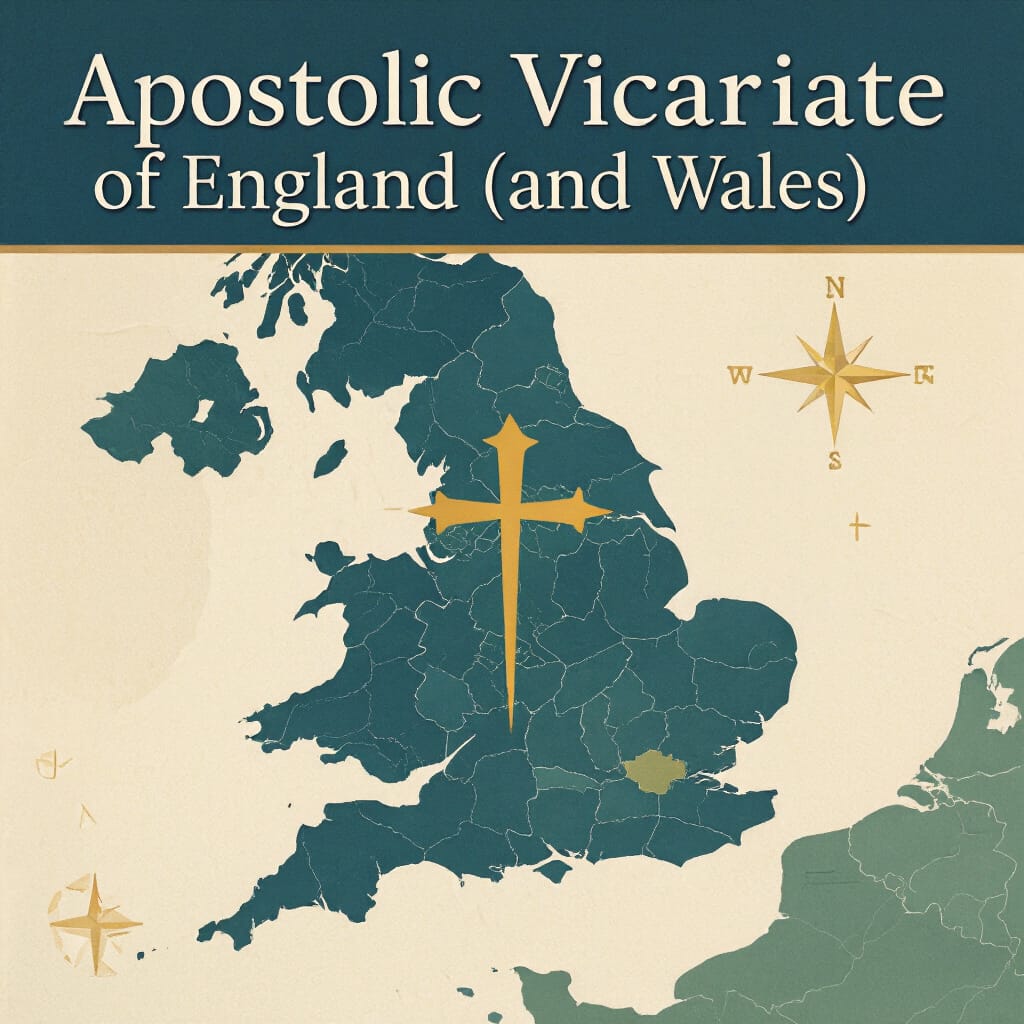
Oh, listen with hearts set ablaze! The Apostolic Vicariate of England (and Wales) was not just an ordinary ecclesiastical realm; it was a beacon of unwavering faith, a holy fortress standing tall amidst the tumult and turmoil of a fractured land. It was the sacred shield of the Roman Catholic Church, a divine branch nurtured by the guiding hand of a vicar apostolic—anointed by Heaven itself, a humble yet mighty titular bishop dedicated to shepherding souls through the darkest nights of doubt and despair.
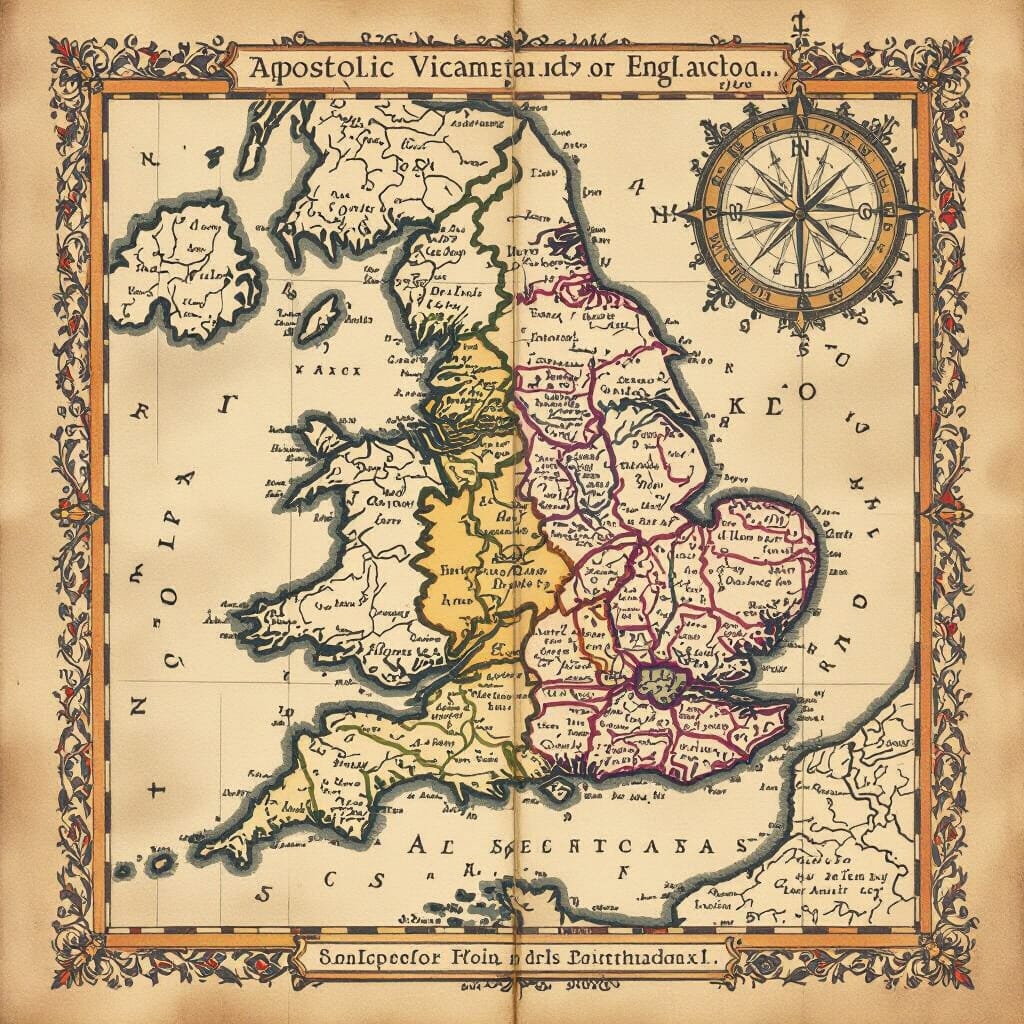
From its divine inception in the year 1623, a spark was ignited in the depths of history—an unyielding flame of devotion that refused to be extinguished. And in 1688, that radiant light was brilliantly divided into four mighty districts, each a testament to the indomitable spirit of faith and hope that courses through the heart of England and Wales!
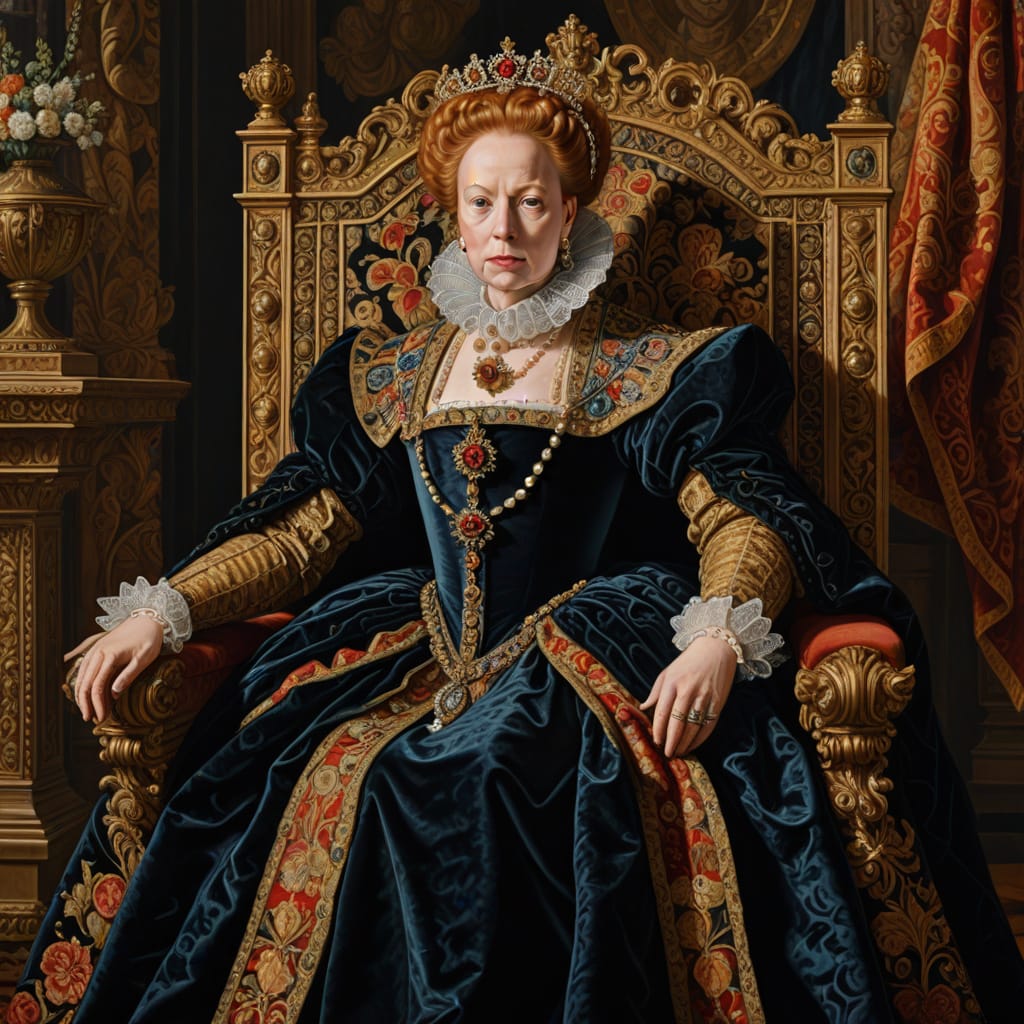
The momentous dawn of Queen Elizabeth I’s reign in 1559 unleashed a tumult of soul-shaking, heart-wrenching upheaval across England and Wales! The bishops, those venerable shepherds of faith, were thrust into an impossible crucible — an apocalyptic choice was thrust upon the bishops of England and Wales—a choice that would pierce their very souls with the weight of destiny! They were compelled to forsake the ancient, sacred authority of the Pope by swearing the Oath of Supremacy enacted by the Act of Supremacy of 1559 a declaration as bitter as betrayal, as heartbreaking as loss itself.
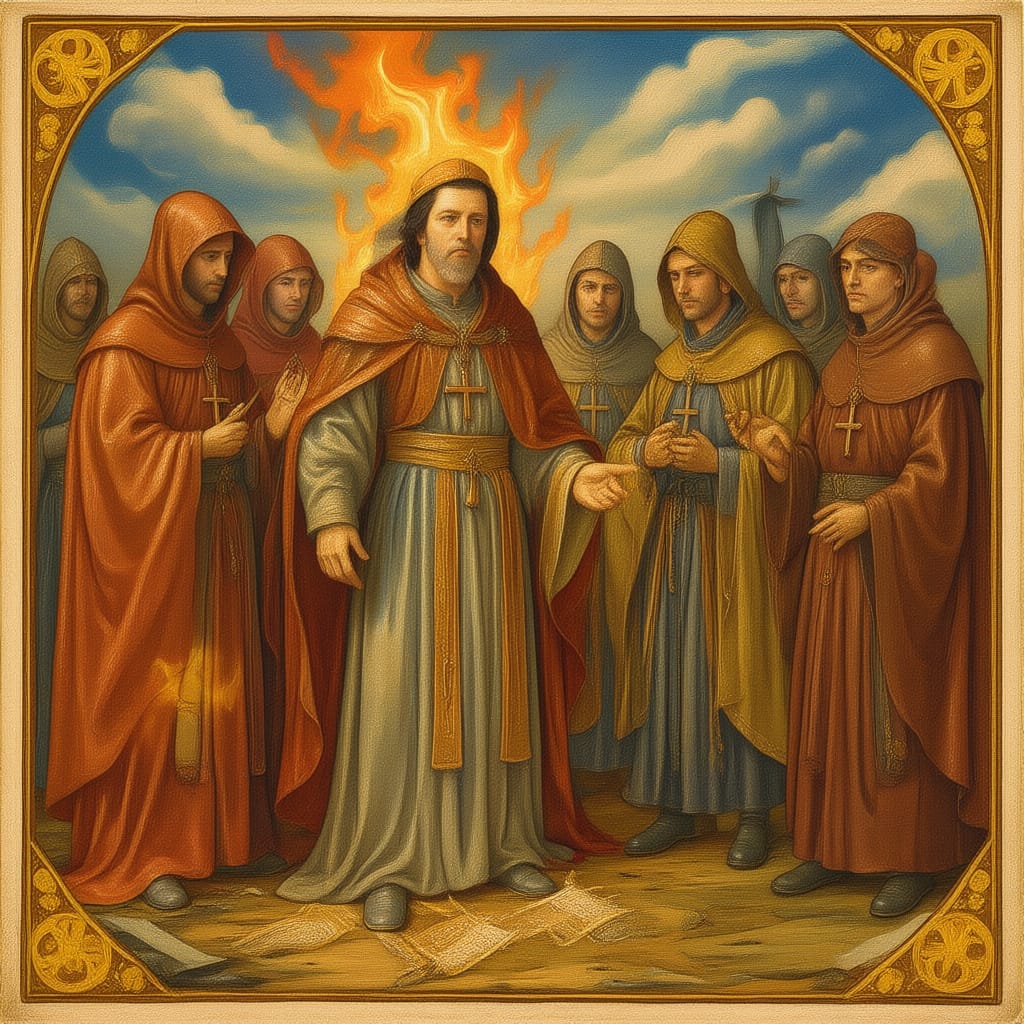
. The Oath of Supremacy—oh, how it roared like a blazing fire in the heart of a nation! It demanded unwavering loyalty, an unbreakable vow from every soul stepping into the halls of power—be it in the sacred chambers of the government or the hallowed grounds of the Church—binding them forever to the monarch as the divine, unassailable Supreme Governor of the Church! To refuse this solemn pledge was to cast oneself into the terrifying abyss of treason, to betray one’s homeland and its sacred faith with reckless abandon!
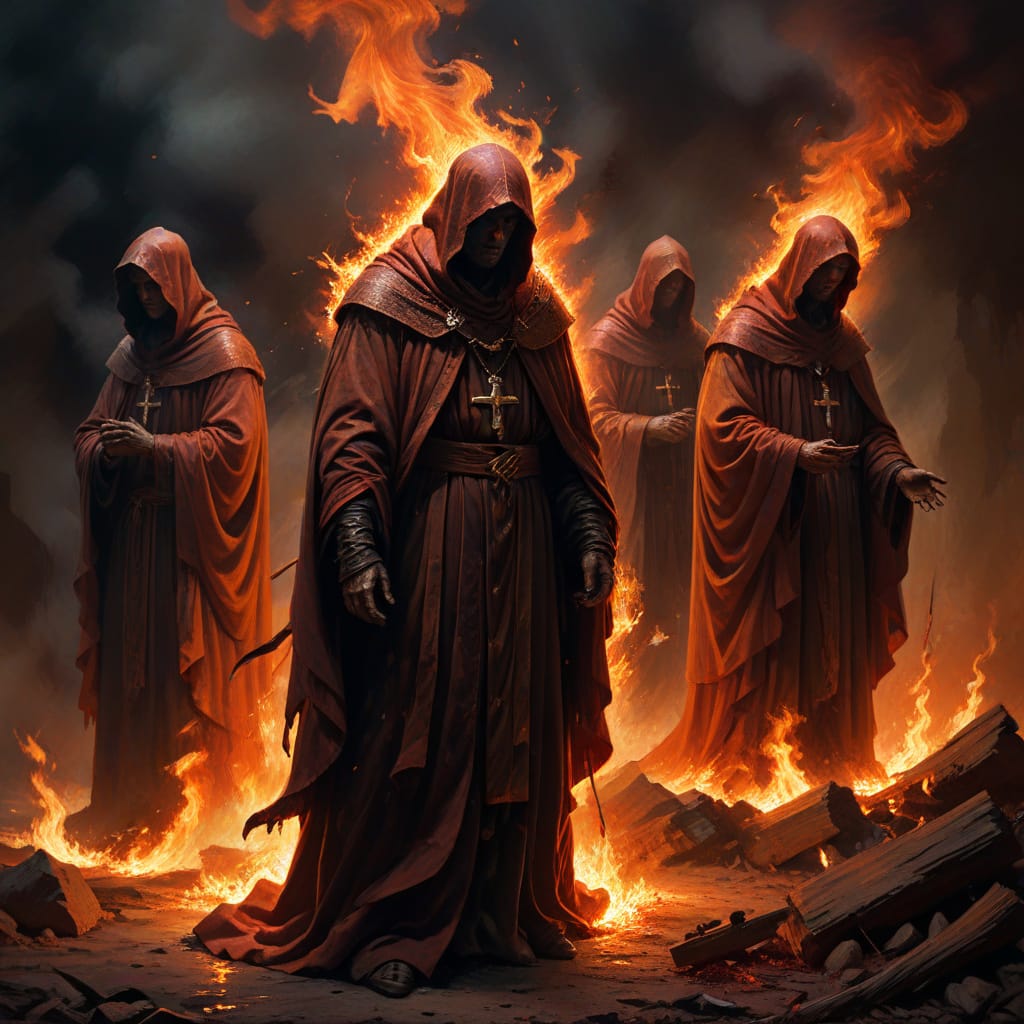
To refuse was to plunge them into exile to suffer the agony of losing their, their spiritual crowns, and their divine calling. The courage required to stand firm and loyal to Rome was nothing short of heroic, but it came at an agonising price! These proud custodians of spiritual truth—whose hearts beat with sacred devotion—were ruthlessly cast down, their episcopal thrones of authority violently torn from beneath them.
Some, driven by an unquenchable love for the Church, dared to escape into foreign lands, carrying the torch of their faith across oceans and borders!
The final tragic chapter was written in the life of Thomas Goldwell, Bishop of St Asaph, whose earthly pilgrimage ended in Rome on April 3, 1585—his death a poignant testament to sacrifice and steadfastness in the face of relentless adversity. Their stories blaze with the fiery passion of souls unyielding, forever etched in the eternal furnace of history as an indomitable tribute to faith, loyalty, and the unbreakable spirit that refuses to be silenced!
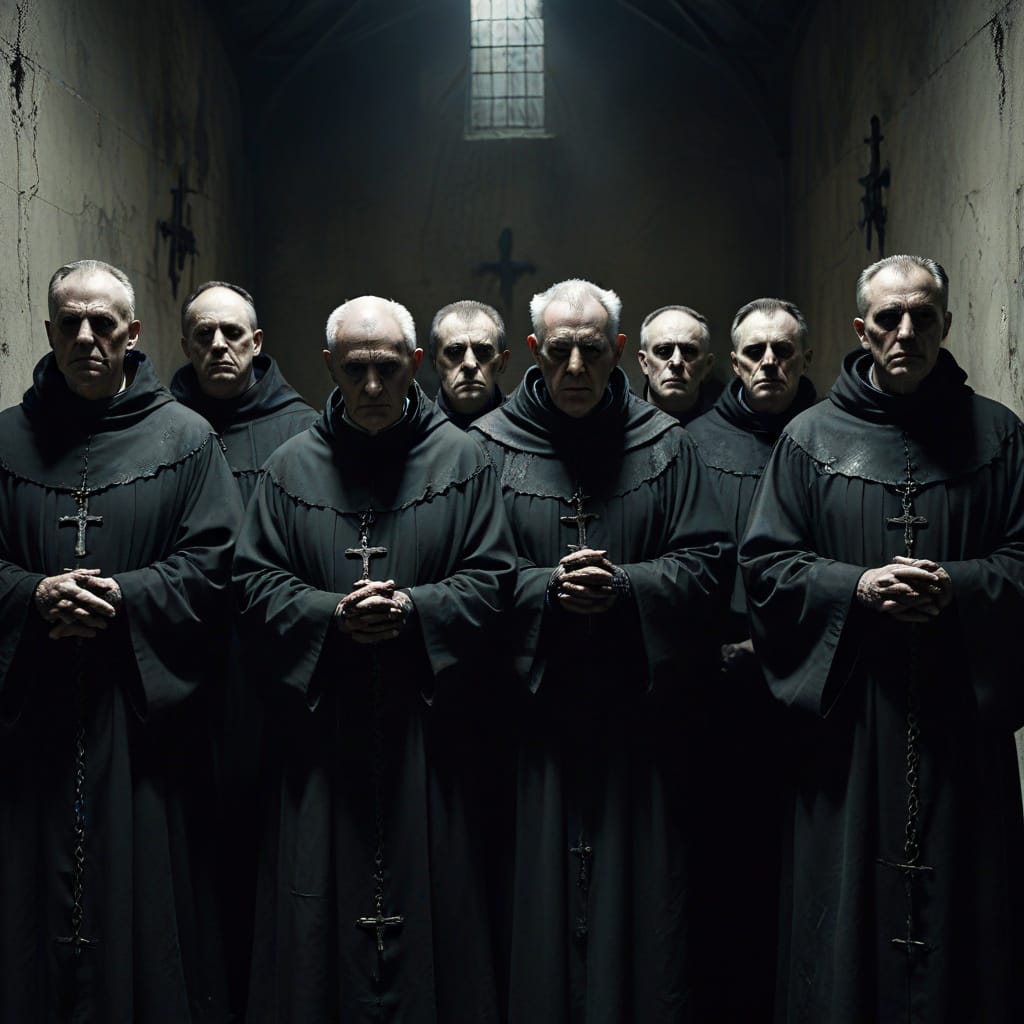
The anguish of their sacrifice was etched into every prison cell—most of these valiant bishops endured years of torment, imprisoned in grim dungeons, their spirits tested beyond measure, their bodies weakened but their faith.

The Oath of Supremacy—oh, how it roared like a thunderstorm across the very soul of a nation! It demanded from every humble servant, from every towering figure of power, that they cast aside their fears, their loyalties, their consciences, and swear their unshakable allegiance to the monarch—who was declared, with fierce authority, the Supreme Governor of the Church! This ruthless mandate was unleashed by none other than the fiery, tempestuous King Henry VIII—whose heart burned with a ruthless desire to reshape the very fabric of faith and kingdom. Henry VIII—oh, the roaring lion basking in the flames of his ambitions!
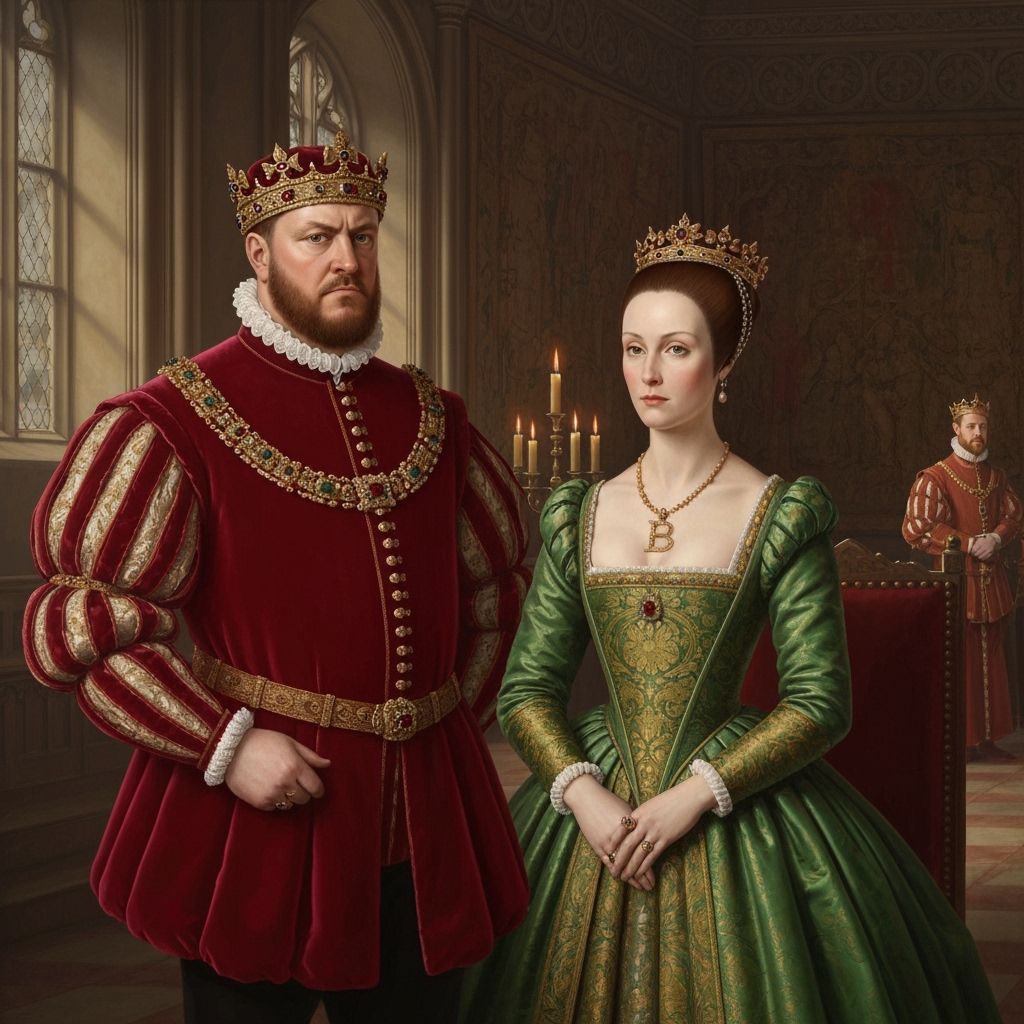
To refuse was to brand oneself a traitor, a fugitive from loyalty itself, condemned to the shadows of treason’s cold embrace! He entwined religion and succession in a tangled, fiery knot, demanding an Oath of Succession 1553/4 to proclaim his marriage to Anne Boleyn valid and his children’s right to rule unquestioned.
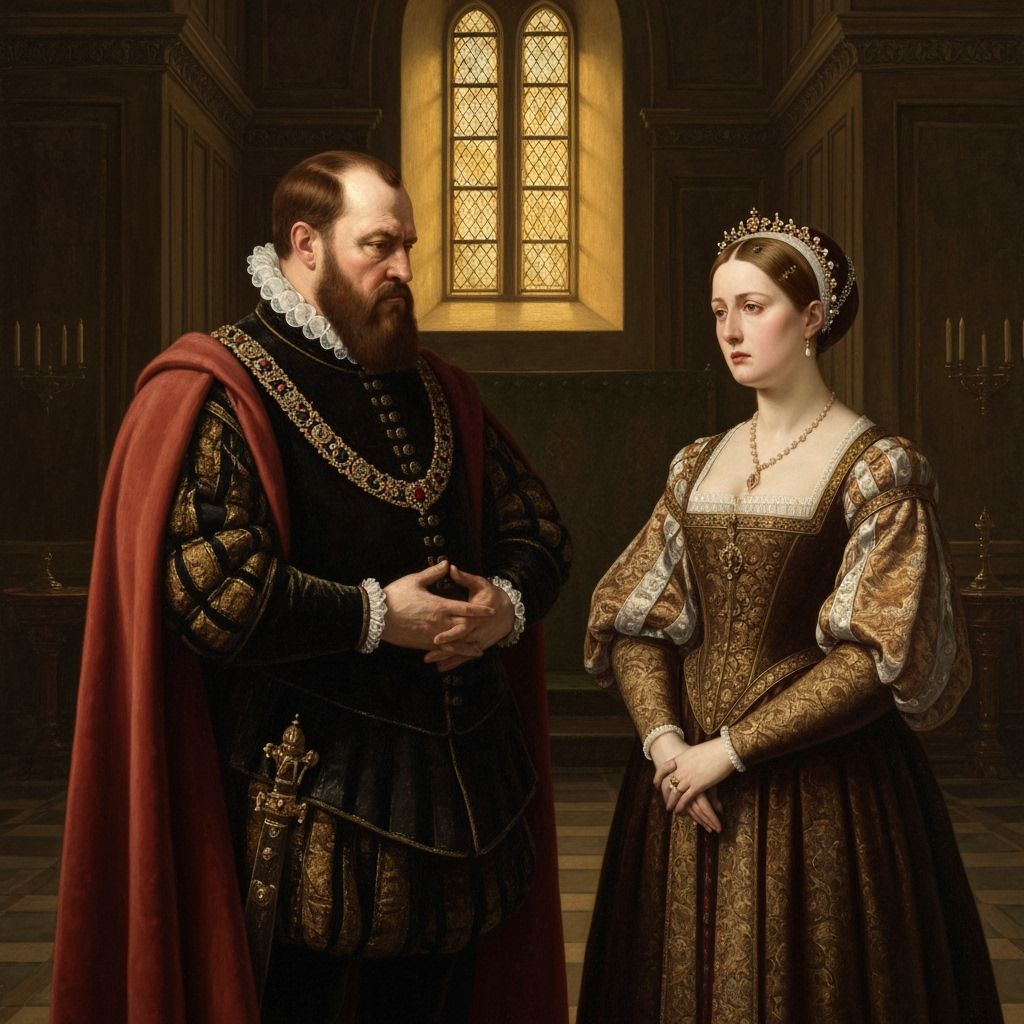
This was no mere affirmation; it was a declaration that Henry possessed the divine right to nullify his marriage to Katherine of Aragon—his desires dictating the fate of eternity! As Henry’s passions and machinations spun wildly, the very line of succession shifted like a turbulent tide—his children rising and falling with the whims of his will, demanding loyalty anew, legislation twisting itself to their fervent beliefs about faith and right.

This blazing, unstoppable inferno of defiance and radical transformation—the magnificent Act of Supremacy of 1534—set the entire world aflame with its fierce fury! It was a tumultuous showdown, a monumental roar of rebellion that shook the very foundations of history, igniting passions and daring to rewrite the course of destiny with every blazing word!
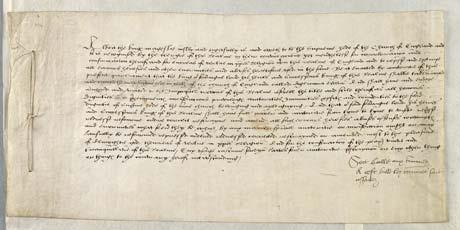
Henry VIII, the relentless architect of change, then demanded the Oath of Supremacy 1534: a crushing proclamation that he alone held divine authority over the Church of England.
Edward VI’s Device for the Succession
On that fateful day, the 28th of January, in the year of our Lord 1547, a profound and shattering moment gripped the very soul of our realm. The mighty and formidable King Henry VIII, a titan of power and a colossus among men, drew his last breath within the hallowed walls of the Palace of Whitehall, amidst the grandeur and solemnity of London. At the tender age of 55 years, he departed from this mortal coil, leaving behind a legacy etched into the annals of history—an era marked by tumult, transformation, and the indelible mark of a ruler whose shadow loomed vast over the land he loved. The nation mourned, hearts breaking with an unbearable grief, as the world bore witness to the end of a legend—an end that would forever echo through the corridors of time
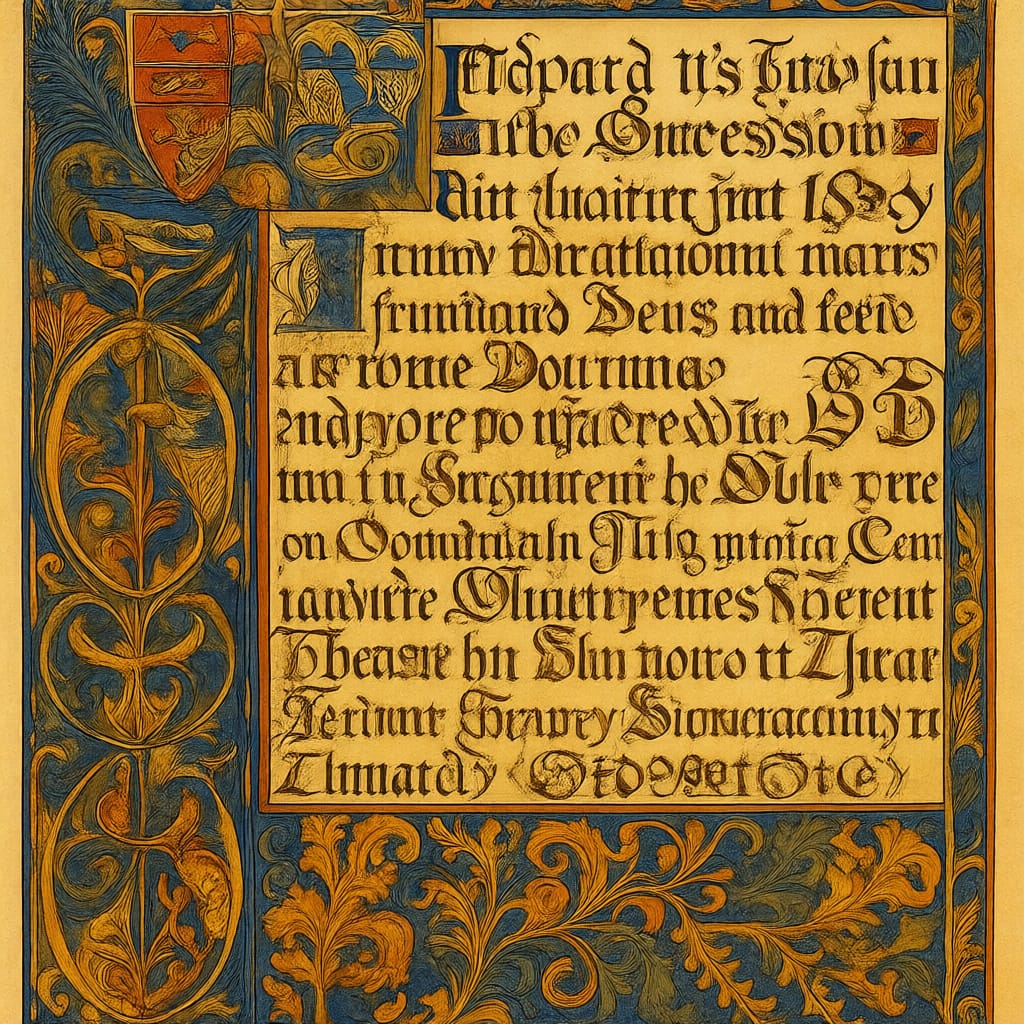
In the fervent flicker of his soul’s deepest conviction, Edward VI, Henry VIII’s eldest surviving legitimate son, poured his very essence onto the parchment in 1553, crafting a fervent declaration—a “Devise for the Succession”—that shook the very foundations of destiny itself! Edward
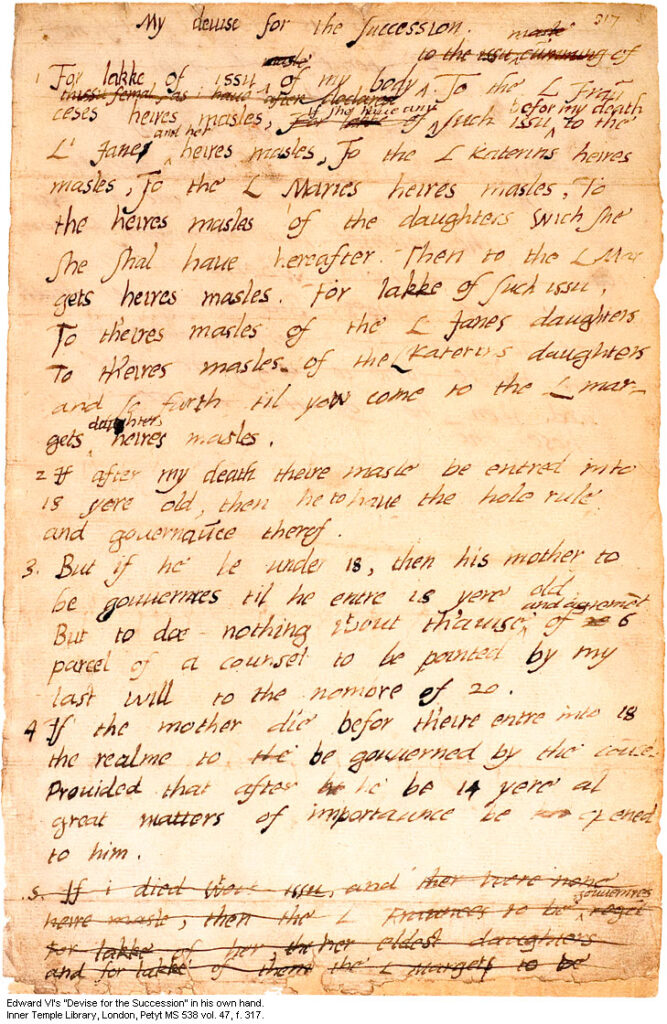
With trembling hands and an unyielding heart, he disinherited his own half-sisters, Mary and Elizabeth, fierce in his resolve to shield England from the dark shadow of Catholic tyranny! This was no mere document; it was a burning testament of love for his land, a relentless stand to preserve the flame of Protestantism against the encroaching darkness!

With every stroke of his pen, he crowned his Protestant cousin, Lady Jane Grey, as the destined heir, sealing her fate along with her male heirs—an act of unwavering faith and desperate hope! Though pressured by his council, Edward’s soul was set ablaze with a fiery purpose: to ensure that the light of Protestantism would forever burn bright in England’s heart, unquenchable and eternal!
The Act of Supremacy of 1534—a bold, thunderous declaration of independence, a seismic shift tearing through the very soul of the Church and the nation—was utterly dismantled, utterly overturned, in a moment of fiery revival during Queen Mary I’s reign in 1555.
In the blazing depths of history’s flaming heart, the Act of Supremacy of 1534, a seismic declaration of royal defiance, was cast down and shattered, only to be resurrected in the shadows in 1555 under the ruthless hand of Queen Mary I. Oh, how her soul burned with fervent passion to restore the ancient and divine authority of the Holy Father, to sweep away the heretical chains of reform and to plunge England back into the sacred embrace of Catholic obedience!
Repeal of Act of Supremacy 1555
Whereas, since the twentieth year53 of King Henry VIII of famous memory, father unto your Majesty, … much false and erroneous doctrine hath been taught, preached and written … , by reason whereof as well the spiritualty as the temporalty of your Highness’s realms and dominions have swerved from the obedience of the See Apostolic and declined from the unity of Christ’s church, and so have continued until …, your Majesty being … raised up by God and set in the seat royal over us …, the Pope’s Holiness and the See Apostolic sent hither … the most reverent father in God, the lord Cardinal Pole, legate de latere,54 to call us home again into the right way …; and we … , seeing by the goodness of God our own errors, have acknowledged the same unto the said most reverend father, and by him have been … received and embraced into the unity and bosom of Christ’s church … , upon our humble submission and promise … to repeal and abrogate such acts and statutes as had been made in Parliament since the said twentieth year of the said King Henry VIII against the supremacy of the See Apostolic… [therefore, such legislation is repealed] .
And finally, where certain acts and statutes have been made in the time of the late schism concerning the lands and hereditaments of archbishoprics and bishoprics, the suppression and dissolution of monasteries, abbeys, priories, chantries, colleges, and all other the goods and chattels of religious houses; since the which time the right and dominion of certain lands and hereditaments, goods and chattels, belonging to the same be dispersed abroad and corne to the hands and possessions of divers and sundry persons who by gift, purchase, exchange, and other means, according to the order of the laws and statutes of this realm for the time being, have the same; for the avoiding of all scruples that might grow by any the occasions aforesaid or by any other ways or means whatsoever, [we ask that] it may please your Majesties to be intercessors and mediators to the said most reverend father … that all such causes and quarrels as by pretence of the said schism or by any other occasion or mean whatsoever might be moved, by the Pope’s Holiness or See Apostolic or by any other jurisdiction ecclesiastical, may be utterly removed and taken away; so as all persons having sufficient conveyance of the said lands and hereditaments, goods and chattels, … may without scruple of conscience enjoy them Excerpts from the Act of Supremacy 1559
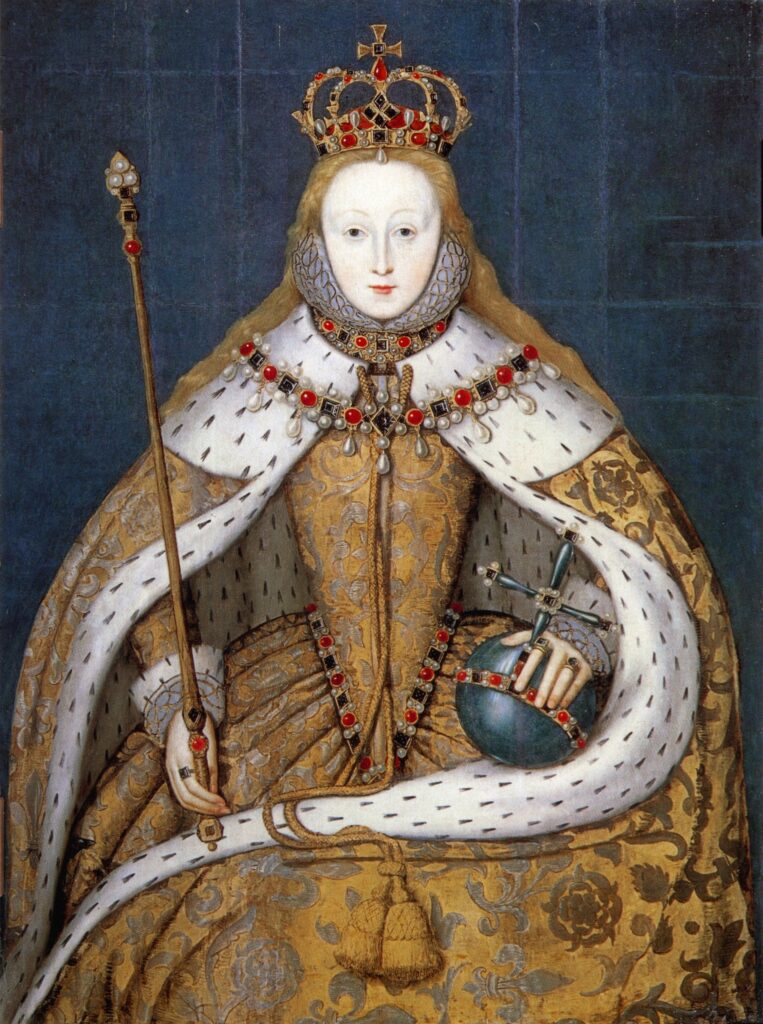
An acte restoring to the crown the ancient jurisdiction over the state ecclesiastical and spiritual and abolishing all foreign power repugnant to the same. Most humbly beseech your most excellent majesty your faithful and obedient subjects, the lords spiritual and temporal and the commons in this your present parliament assembled, that, where in time of the reign of your most dear father of worthy memory, King Henry VIII, divers good laws and statutes were made and established, as well for the utter extinguishment and putting away of all usurped and foreign powers and authorities out of this your realm and other your highness’s dominions and countries, as also for the restoring and uniting to the imperial crown of this realm the ancient jurisdictions, authorities, superiorities, and pre-eniinences to the same of right belonging and appertaining; by reason whereof we, your most humble and obedient subjects, from the five-and-twentieth year of the reign of your said dear father, were continually kept in good order, and were disburdened of divers great and intolerable charges and exactions before that time unlawfully taken and exacted by such foreign power and authority as before that was usurped, until such time as all the said good laws . . . in the first and second years of the reigns of the late King Philip and Queen Mary . . . were . . repealed . . . ;’ by reason of which act of repeal your said humble subjects were eftsoons brought under an usurped foreign power and authority… may from the last day of this session of parliament, by authority of this present parliament, be repealed, and shall from thenceforth be utterly void and of none effect . . .
And for the better observation and maintenance of this act, may it please your highness that it may be further enacted by the authority aforesaid that all and every Archbishop, Bishop, and all and every other ecclesiastical person and other ecclesiastical officer and minister, of what estate, dignity, pre-eminence, or degree soever he or they be or shall be, and all and every temporal judge, justicer, mayor, and other lay or temporal officer and minister, and every other person having your highness’s fee or wages within this realm or any your highness’s dominions shall make, take, and receive a corporal oath upon the Evangelist, before such person or persons as shall please your highness, your heirs or successors, under the great seal of England to assign and name to accept and take the same, according to the tenor and effect hereafter following, that is to say- (see Oath of Supremacy 1559 below)
And for the more sure observation of this act and the utter extinguishment of all foreign and usurped power and authority, may it please your highness that it may be further enacted by the authority aforesaid that, if any person or persons dwelling or inhabiting within this your realm or in any other your highness’s realms or dominions . . . , shall by writing, printing, teaching, preaching, express words, deeds, or act, advisedly, maliciously, and directly affirm, hold, stand with, set forth, maintain, or defend the authority, preeminence, power, or jurisdiction, spiritual or ecclesiastical, of any foreign prince, prelate, person, state, or potentate whatsoever, heretofore claimed, used, or usurped within this realm or any dominion or country being within or under the power, dominion, or obeisance of your highness, or shall advisedly, maliciously, or directly put in ure or execute anything for the extolling, advancement, setting forth, maintenance, or defence of any such pretended or usurped jurisdiction, power, pre-eminence, or authority, or any part thereof, that then every such person and persons so doing and offending, their abettors, aiders, procurers, and counsellors, being thereof lawfully convicted and attainted according to the due order and course of the common laws of this realm [shall suffer specified penalties, culminating in punishment for high treason on the third offence] . . . .
~
Oath of Supremacy, 1559
I, A. B., do utterly testify and declare in my conscience that the Queen’s Highness is the only supreme governor of this realm, and of all other her Highness’s dominions and countries, as well in all spiritual or ecclesiastical things or causes, as temporal, and that no foreign prince, person, prelate, state or potentate hath or ought to have any jurisdiction, power, superiority, pre-eminence or authority ecclesiastical or spiritual within this realm; and therefore I do utterly renounce and forsake all foreign jurisdictions, powers, superiorities and authorities, and do promise that from henceforth I shall bear faith and true allegiance to the Queen’s Highness, her heirs and lawful successors, and to my power shall assist and defend all jurisdictions, pre-eminences, privileges and authorities granted or belonging to the Queen’s Highness, her heirs or successors, or united or annexed to the imperial crown of this realm. So help me God, and by the contents of this Book.
Those who held on to lands seized from the monasteries clung to their worldly riches, yet their souls trembled beneath the weight of Catholic revival’s relentless, burning justice. This was not merely legislation; it was an impassioned, soul-stirring battle cry—an ardent plea to return to the divine, to restore the revered Pope’s sovereignty in England—and an uncompromising stand against the heresies of reform, a fervent vow that the true path, steeped in faith and tradition, would once again reign supreme!
With the Second Statute of Repeal, she declared an unquenchable war against the heretical alterations of Henry’s cruel reign—erasing the very foundation upon which the crown had once claimed to stand as sole sovereign of divine truth. This act—the furious rebuff of centuries of protest—restored the papal throne to its rightful place in England, reigniting the sacred flames of Catholic doctrine, ripping asunder the misguided assertion that kings and queens could be the ultimate arbiters of heavenly authority. It was a passionate repudiation of the revolutionary spirit, a brutal reclaiming of spiritual sovereignty.
With an unstoppable surge of righteous fury, the Second Statute of Repeal roared back into existence, restoring the papal throne to its rightful place as the ultimate authority, as the divine head of the Church of England!
Yet, the winds of change swept through, snatching it away under the reign of Queen Mary I—her heart heavy with sorrow—and then rekindled, fiercely restored under the reign of Queen Elizabeth I, whose soul fought to preserve the very soul of England’s spiritual sovereignty in 1558!
This fiery oath didn’t rest—it extended its relentless clasp to Members of Parliament and even to scholars in the universities, demanding their loyalty and allegiance! And in the distant land of Ireland, in 1537, the same divine torch was carried forward; the Irish Supremacy Act declared Henry VIII’s unwavering authority as the supreme head of the Church of Ireland, sealing their allegiance with the same fiery intensity—an unbreakable chain of loyalty that could be shattered only by rebellion and defiance! Oh, how this oath ignited passions, fueled conflicts, and forever shaped the destiny of nations!
Those brave enough—or perhaps desperate enough—to cling to Rome faced merciless exile, their hearts shattering as they were cast down and replaced by strangers, mere priests of a broken church. unbreakable. Many faded away in captivity, their flames of devotion smothered but never extinguished;